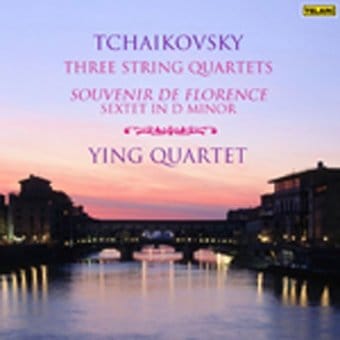Ying Quartet Tchaikovsky: Three String Quartets And "Souvenir de Florence" Sextet In D Minor (2-CD)

Out of Print:
Future availability is unknown
|
on most orders of $75+
|
Brand New
|
Related products:
CD Details
- Number of Discs: 2
- Released: April 24, 2007
- Originally Released: 2007
- Label: Telarc
Tracks on Disc 1:
- 1.I. Allegro con spirito
- 2.Ii. Adagio cantabile e con moto
- 3.Iii. Allegretto moderato
- 4.Iv. Allegro vivaceQuartet No. 2 in F major, Op. 22
- 5.I. Adagio - Moderato assai
- 6.Ii. Scherzo: Allegro giusto
- 7.Iii. Andante ma non tanto
- 8.Iv. Finale: Allegro con moto
Tracks on Disc 2:
- 1.I. Moderato e semplice
- 2.Ii. Andante cantabile
- 3.Iii. Scherzo: Allegro non tanto e con fuoco
- 4.Iv. Finale: Allegro giustoQuartet No. 3 in E - flat minor, Op. 30
- 5.I. Andante sostenuto - Allegro moderato
- 6.Ii. Allegretto vivo e scherzando
- 7.Iii. Andante funebre e doloroso, ma con moto
- 8.Iv. Finale: Allegro non troppo e risoluto
Product Description:
Throughout his life, Tchaikovsky sought and received the musical favor of Europe, but forever remained deeply rooted in his native Russia. Despite this attachment to his homeland, the famous Mighty Five (Balakirev, Mussourgsky, Borodin, Cui, and Rimsky-Korskov) eschewed his academic associations as an insult to their interest in Russian folk traditions. In the West, however, he was viewed as one of the prominent "young Russians."
In his chamber music, Tchaikovsky was more German than Russian, at least in his indebtedness to Brahms. Yet at the same time, an identifiable Russian spirit persists in these three string quartets and his sextet, Souvenir de Florence. Like many other nationalistic composers, Tchaikovsky was very intimate and universal when he turned to chamber music. His D Major Quartet (String Quartet No. 1) came through an invitation from Nikolai Rubinstein of the Moscow Conservatory for a performance for the Assembly of Nobles. It is known as "Accordion" because the opening theme of the first movement is highlighted by rising and falling chords.
The second of the three string quartets came in 1874, in a debut performance held in the apartment of Nikolai Rubinstein. The event is considered the beginning of the end of the friendship between the famous composer and pianist Anton Rubinstein, who found the work confusing and "not at all in the chamber style." Tchaikovsky's Second Quartet did in fact push the envelope with chromaticism, irregular rhythms, and fugal writing. Fortunately, the other members of the audience enjoyed it immensely, and it has since become his most popular of the three quartets.
The third quartet was written in 1876 and was dedicated to Ferdinand Laub, who had been a champion of the composer and the first violinist in the Russian Music Society's quartet. Despite the triumphant reception for Quartet No. 3, Tchaikovsky was not completely satisfied, marking yet another step in the disillusionment that would haunt his life.
The Souvenir de Florence was inspired by Tchaikovsky's love of the Italian city where he had spent time working on his opera The Maid of Orleans. The Sextet opens boldly but is followed in the second movement Adagio by a moving duet for violin and cello. The third movement Allegretto is an elegy, but includes sharp dynamic contrasts. In the final movement, an energetic fugue, Tchaikovsky reflects a "Russianness" that is also associated with Borodin.
In his chamber music, Tchaikovsky was more German than Russian, at least in his indebtedness to Brahms. Yet at the same time, an identifiable Russian spirit persists in these three string quartets and his sextet, Souvenir de Florence. Like many other nationalistic composers, Tchaikovsky was very intimate and universal when he turned to chamber music. His D Major Quartet (String Quartet No. 1) came through an invitation from Nikolai Rubinstein of the Moscow Conservatory for a performance for the Assembly of Nobles. It is known as "Accordion" because the opening theme of the first movement is highlighted by rising and falling chords.
The second of the three string quartets came in 1874, in a debut performance held in the apartment of Nikolai Rubinstein. The event is considered the beginning of the end of the friendship between the famous composer and pianist Anton Rubinstein, who found the work confusing and "not at all in the chamber style." Tchaikovsky's Second Quartet did in fact push the envelope with chromaticism, irregular rhythms, and fugal writing. Fortunately, the other members of the audience enjoyed it immensely, and it has since become his most popular of the three quartets.
The third quartet was written in 1876 and was dedicated to Ferdinand Laub, who had been a champion of the composer and the first violinist in the Russian Music Society's quartet. Despite the triumphant reception for Quartet No. 3, Tchaikovsky was not completely satisfied, marking yet another step in the disillusionment that would haunt his life.
The Souvenir de Florence was inspired by Tchaikovsky's love of the Italian city where he had spent time working on his opera The Maid of Orleans. The Sextet opens boldly but is followed in the second movement Adagio by a moving duet for violin and cello. The third movement Allegretto is an elegy, but includes sharp dynamic contrasts. In the final movement, an energetic fugue, Tchaikovsky reflects a "Russianness" that is also associated with Borodin.
Product Info
- UPC: 089408068522
- Shipping Weight: 0.25/lbs (approx)
- International Shipping: 2 items




